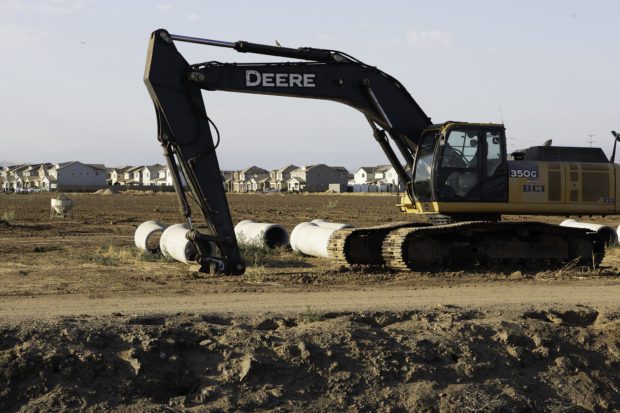

Ever experience that painful tailbone landing that follows when your playmate suddenly jumps off their end of the seesaw? To avoid it you had to see it coming, then put your feet down fast. It’s like they say in politics, you can only be surprised if you’re not paying attention.
Fresno County’s inattentive urban leaders and a number of rural ones will soon be hitting bottom, too. Elected officials and business leaders alike are currently riding high, their heels kicking the air.
Boosted by unreliable polling results, developer money and hubris, Clovis Mayor Jose Flores and Fresno County Supervisor Brian Pacheco scornfully told advocates in a pair of July meetings that this is how laws and sausage are made; the public has to watch them decide, and the most important climate debate in Fresno County history comes down to a few weeks of rushed backroom dealmaking among a handful of conservative politicians.
They couldn’t be more wrong and are about to learn why balanced governance works best, a painful lesson that the gravitational force of a plebiscite will soon force upon them. You see, everyone votes this time, not just them, and the public has stepped off the other end of Measure “C” first. Advocates’ feet are on the ground, in the community, continuing to fight for equity in transportation spending embedded in goals of climate resilience.
The public debates at the Fresno Council of Governments (COG) and Fresno County Board of Supervisors meetings in July were a display of arrogance by elected officials accustomed to ignoring the Brown Act prohibition on step meetings and having the final word on significant budget and land-use votes at their city councils. It’s standard operating procedure throughout Fresno County.
Again, they’re used to having the final word, the final vote. But not this time. This time the public votes, and long before they do, advocates will be out demonstrating and protesting, telling the entire community the truth behind the lies coming from the business community; sharing Measure C’s long history of false and broken promises; and adding up the massive subsidies being created for industrial growth in south Fresno and continued white-collar flight to the foothills.
It feels like the 1980s around here again, the corrupt era of Fresno and Clovis politicians trading rezones for contributions of every kind, assessing low impact fees and ignoring unbridled sprawl’s community-wide impacts.
Consider the words of incoming Fresno City Council Member Annalisa Perea. Her father, Henry R. Perea, came up through the local political ranks back then and now mentors a whole crop of local young officeholders. Son Henry T. works as a Chevron lobbyist, having left the State Assembly a year early to join the ranks of Sacramento lobbyists.
Annalisa Perea best captured the spirit of Fresno’s special brand of subservient politics in her Fresno Bee candidate interview in May when she stated that she wants to “cut the red tape and roll out the red carpet” for development of every kind. That’s old school Fresno for a new generation.
Yet, the Fresno City Council has been left out of this debate, sidelined by Council Member Esmeralda Soria’s failure as the Council’s representative on the Fresno County Transportation Authority to act when the Measure C renewal committee was being formed in early 2021. She later attended a committee meeting or two as Mayor Jerry Dyer’s alternate and filled in for him again at a COG meeting, but that was the extent of the City Council’s direct involvement.
Fresno has been represented solely by the conservative former police chief turned politician. A rookie mayor halfway through his second year in office, Dyer’s biggest political backers are the Assemis and their network of residential development corporations and agricultural interests through which they legally sidestep campaign contribution limits. They’re also arguably the biggest beneficiaries of Measure C subsidies.
Madera’s Mini-C. Measure T in Madera County is best regarded as C’s mini-me, a smaller version of the exact same set of problems: the community excluded, industrial and sprawl subsidies prioritized, arrogant officials and no attention to climate change or equity. Both counties seek to slash transit funding and have had no discussions of electrification, climate resiliency or rural high-speed Internet.
Many of the same developers work both sides of the river, and great emphasis is being placed on “planned communities” in the rangeland of eastern Madera County along Highway 41. These function as bedroom communities for people working in Fresno and Clovis. More development is sought in the wildfire zones of the foothill chaparral and Sierra forests, and large-scale trucking centers are being approved for Highway 99 at the San Joaquin River.
The renewal committees in both counties were stacked with conservative interests, including the politicians themselves. The most outspoken rural mayor in the process has been Parlier’s Alma Beltran, a 2016 Trump supporter. True to form, she gaslit the entire audience of more than 200 gathered at Fresno City Hall where the July COG board meeting was held to accommodate the crowd.
An earlier attempt fell apart when the agency’s online meeting setup proved inadequate, perfectly demonstrating the long-standing complaint that the agency does not engage meaningfully with the public.
“I wish that they would have worked more on being more engaged in the workshops,” Beltran said misleadingly of the outspoken attendees alerted to the crisis by the 36-member Transportation4All.org coalition, according to a Fresno Bee story. Right. All two of them.
In the late fall, staff and consultants announced a series of public forums with only one day’s notice during a pandemic wave. Nobody showed. In the spring, the public did turn out in force in Kerman and Clovis. None of their suggestions were incorporated into the executive committee considerations.
Politicians from Clovis to Huron, and business leaders from the Chamber of Commerce to Community Medical Centers, have chosen the worst possible moment to look away from the public. They’re in for a hard landing.
